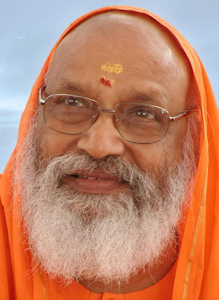Arjuna asks Sri Krishna (BG 14.21) to narrate the signs and behaviour of a GunAtita, i.e., one who has transcended three constituents (sattva, rajas, and tamas) of nature. Sri Krishna replies that he neither dislikes illumination (knowledge), activity, and delusion when they appear in the form of objects of experience), nor does he long for them when they disappear. Continue reading
Tag Archives: thoughts
Q.509 Direct Path vs Traditional – Pt. 2
Part 2 – Free Will
Q: We talked earlier about the difference between the direct path and the traditional path.
I was looking through the free will section in your book Back to the Truth and I found this quotation by Franics Lucille:
We are entirely conditioned; therefore, there is no free will. It appears as though we exercise free choice, but in fact we are only reacting like automatons, running through the same patterns of our bio-sociological heritage without respite, leading invariably to the same old reactions, like a vending machine dispensing soft drinks in a train station. As individuals, our freedom is illusory, with the exception of the freedom which is ours at each moment to stop taking ourselves for separate individuals and thus putting an end to our ignorance and our suffering.
On the other hand, at the level of our deepest being, everything flows out of our freedom. Every thought, every perception takes birth because we want it to. We cannot understand this at the level of thought, but we can experience it. When we are totally open to the unknown, the personal entity is absent; then we realize that the tangible and intelligible universe arises out of this openness in the eternal present. We want, create and are at every moment everything in the unity of awareness. (Ref. 8)
[Waite, Dennis. Back To The Truth: 5000 Years Of Advaita (p. 76). NBN_Mobi_Kindle. Kindle Edition.]
Continue readingConsciousness – Not such a Hard Problem (1 of 2)
This is an article I wrote for a Philosophy magazine 5 years ago but it was not published. It was included in my book ‘Western Philosophy Made Easy’, which was based upon the 18-part ‘Overview of Western Philosophy‘.
ABSTRACT
The studies by neuroscience into the functioning of the brain will tell us nothing about Consciousness. We must differentiate between Consciousness and awareness. Consciousness enables the brain to perceive just as electricity enables the computer to process data. The computer does not generate electricity; the brain does not produce Consciousness.
*****
Ever since the ‘study’ of consciousness began to be an academically acceptable area of research amongst scientists, both they and Western philosophers have been heading deeper and deeper into a conceptual cul-de-sac. At the root of the problem is the tacit assumption that science will (one day) be able to provide an explanation for everything. But, more specifically as regards this particular issue, the big ‘C’ of Consciousness must be differentiated from the little ‘a’ of awareness. The conflation of the two means that the true nature of Consciousness will forever elude them.
Below, I address some of the various misconceptions that are misleading many of the neuroscientists and philosophers in the field of Consciousness Studies. It is accepted that not all of these investigators will hold such ‘extreme’ positions (and a few are much more liberal in their approach). Continue reading
Vedanta the Solution – Part 53

VEDĀNTA the solution to our fundamental problem by D. Venugopal
Part 53 explains why stopping thoughts or destroying the mind has nothing to do with enlightenment.
There is a complete Contents List, to which links are added as each new part appears.
Swami Dayananda
 In case anyone has not yet heard, Swami Dayananda passed away yesterday, the 23rd September, at 22.18 IST in Rishikesh. Unquestionably the greatest teacher of Advaita in our lifetimes, he must certainly rank as one of the most important ever. Fortunately the legacy of his own writings and transcriptions, and that of the institutions he founded and the teachers he taught, will live on to the benefit of future seekers.
In case anyone has not yet heard, Swami Dayananda passed away yesterday, the 23rd September, at 22.18 IST in Rishikesh. Unquestionably the greatest teacher of Advaita in our lifetimes, he must certainly rank as one of the most important ever. Fortunately the legacy of his own writings and transcriptions, and that of the institutions he founded and the teachers he taught, will live on to the benefit of future seekers.
As a topical example of his teaching, I would like to reproduce the following pieces on the subject of manonAsha. These are extracted from the excellent book already recommended in these pages: ‘Pujya Swami Dayananda Saraswati – his uniqueness in the vedanta sampradaya’ by D. Venugopal.
manonaSha or Thought-free-mind Confusion
There is also a widespread contention among the adherents of aShTANga-yoga that the truth of the self is covered by vRRittis (thought-forms) and it has to be uncovered by stoppage of thoughts (citta-vRRitti-nirodha). Pujya Swamiji clarifies that thought is not the problem. He says:
“The confusion comes from the statement that AtmA is undivided (nirvikalpa). The vision of the ShAstra is that while the knower, known, and knowledge are not separate from AtmA, AtmA is independent of all of them. In MANDukya UpaniShad and in the kArikA, the dreamer is cited as proof that there is no real division (vikalpa) such as dreamer, dream and dreamt, even though during the dream, the division was taken to be real. Continue reading
Q. 375 – Conditions affecting next life
Q: I agree that Reincarnation, the next life, isn’t real. But it’s as real as this life…and, for most of us, this life seems pretty real, even if we know better.
And, as we all know, very, very few people are going to achieve Enlightenment (Liberation, Realization, Moksha) in this lifetime.
For the above 2 reasons, I suggest that Reincarnation is a reasonable thing to be concerned about and to ask a question about. That’s what this question is about. I’ll speak of Reincarnation as if it’s as real as this life seems.
It’s been said that one’s next incarnation depends greatly on one’s thoughts and state in their last moments of this life. I hope that isn’t true, because no one can know what condition they’ll be in when they’re dying. I mean, we aren’t always in the best of condition when we die, are we.
A person, at death, might be delirious, or heavily sedated at a hospital. What then? How does that affect that person’s next life?
Has there been discussion, from theory, regarding how this life—and, in particular, a person’s condition in the last moments of this life–affect that person’s next life?
Responses from , Sitara, Venkat and Dennis Continue reading
Science and Vedanta (Part 2)
 Part 2 of a 3-part essay by Dr. K. Sadananda, AchArya at Chinmaya Mission, Washington.
Part 2 of a 3-part essay by Dr. K. Sadananda, AchArya at Chinmaya Mission, Washington.
Analysis of Objective Sciences
An objective scientist provides a narrow definition for science as that which pertains only to the objectifiable entities using the objective tools. For example, he says that the existence of God cannot be scientifically established as His existence cannot be proved. Obviously the proof that a scientist is looking for is perceptibility, using objective tools of investigation which themselves are limited to only objectifiable entities. He presumes that God is also an object that can be precisely defined in order to differentiate Him from the rest of the objects in the universe, and is therefore quantifiable using perceptual data. If an object cannot be established by using his objective tools, then he asserts that any assumption of its existence becomes blind belief or at the most speculative.
No object can establish its own existence, since it is not a conscious entity. A chair does not say ‘I exist’; a conscious entity has to establish its existence. A scientist, who dismisses the existence of God, since it cannot be proved using his objective tools, takes his own existence for granted without questioning it. He cannot establish his own existence or that he is a conscious entity using the same objective tools that he is using to establish the existence of God. The reason is that he, as a subject knower, cannot be known since he cannot objectify the subject knower. He knows that he exists and that he is conscious entity, without even questioning the validity of his assertions. Continue reading
Spontaneous thoughts
You may recall my earlier Post on “Two Genres of Thought” in Dec 2013.
A just published research study says:
Spontaneous thoughts, intuitions, dreams and quick impressions — we all have these seemingly random thoughts popping into our minds on a daily basis. The question is what do we make of these unplanned, spur-of-the-moment thoughts? Do we view them as coincidental wanderings of a restless mind, or as revealing meaningful insight into ourselves?
A research team from Carnegie Mellon University and Harvard Business School set out to determine how people perceive their own spontaneous thoughts and if those thoughts or intuitions have any influence over judgment. Published in the Journal of Experimental Psychology: General, their research found that spontaneous thoughts are perceived to provide potent self-insight and can influence judgment and decisions more than similar, more deliberate kinds of thinking — even on important topics such as commitment to current romantic partners.
Q. 354 – Consciousness and reality
Q: I have an odd question, a question that I am not even sure how to formulate, it concerns consciousness. Why does Advaita philosophy insist on calling the ultimate reality consciousness? The word consciousness implies intelligence and thought – how do we know that anything outside of brains is in any way conscious? Does this mean that physical reality amounts to the “thoughts” of this consciousness? Can the transcendent consciousness send messages to an embodied consciousness?
I know that an advaitin will say that there is only a non-dual reality but I mean this (however unreal or relative a reality my individual reality may be from an ‘ultimate’ perspective’) in much the same way that, until you received this e-mail from me, you were not aware of any ‘message’ or meaning from me.
If I see a figure in clouds or a face in some wood-grain, should I see this as information with meaning? Does the consciousness ‘behind’ or ‘underneath’ everything communicate meaning with physical events (pictures, or ‘my thoughts’ , or even ambiguous hand-writing!) the way we normally communicate meaning with words and concepts? In other words–if the entire universe is consciousness, can anything be truly mindless or meaningless? Continue reading
